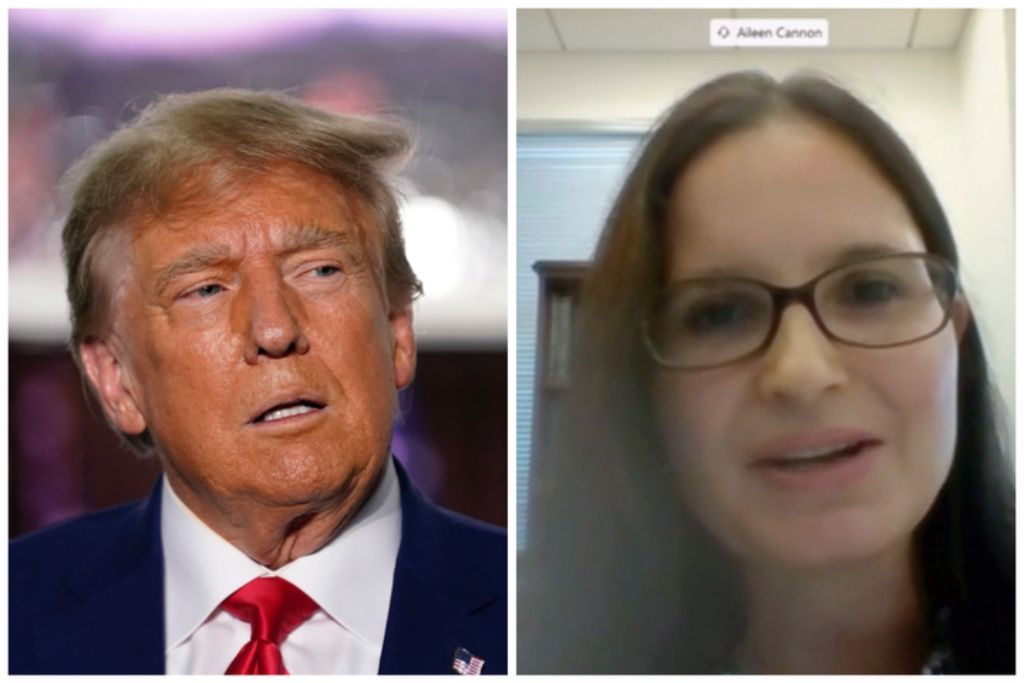
The federal judge presiding over former President Donald Trump‘s Florida classified documents case will allow legal scholars to participate in oral arguments for and against the constitutionality of Jack Smith‘s appointment as special counsel.
U.S. District Judge Aileen Cannon said in an order Tuesday that she would allow 30 minutes for each legal scholar to present their arguments at a June 21 hearing about why Smith may or may not have been legally appointed by the Justice Department. The hearing is part of Trump’s broader effort to dismiss the 40-count indictment accusing him of willful retention of classified records and efforts to obstruct the federal government’s retrieval.

Experts arguing in favor of and against Trump’s position include South Texas College of Law professor Josh Blackman; attorney Gene Schaerr, a former clerk to Justice Antonin Scalia representing ex-Bush and Reagan administration U.S. Attorneys General Michael Mukasey and Edwin Meese; and Matthew Seligman, an attorney representing an anti-Trump coalition of constitutional attorneys and former ranking government officials.
Cannon previously allowed the experts to file amicus or “friend of the court” briefs for and against Trump’s motions to dismiss. In May, she allowed nonparties to the case to request access to participate in oral argument at the hearing so long as they made requests by Monday.
Blackman will represent Landmark Legal Foundation and law professor Seth Barrett Tillman to argue Smith is not an “officer of the United States” but rather an “employee” whose “appointment is inconsistent with the separation of powers and political accountability.”
Schaerr will provide the argument that the special counsel is a “principal officer” whose appointment by Attorney General Merrick Garland should require a Senate confirmation.
“Smith does not have authority to prosecute this case,” according to a brief submitted by a coalition of law professors and the group Citizens United, on which Schaerr will be basing his argument. “Those actions can be taken only by persons properly appointed as federal officers to properly created federal offices.”
Finally, Seligman will be the one dissenting voice arguing in favor of Smith, contending his “appointment Congress may vest in the Attorney General,” and who still answers to, and may be removed by, Garland despite his independent role. Several prominent legal minds are behind this argument, including Watergate-era prosecutor Philip Lacovara, Harvard Law School professor emeritus Laurence Tribe, and lawyer and Trump critic George Conway, among others.
Notably, Hunter Biden, President Joe Biden’s son, sought to make a similar argument about an improperly appointed special counsel in his criminal gun case before it went to trial this week. The younger Biden’s attorney said that special counsel David Weiss “was unlawfully appointed … and Congress has not appropriated funds for the Special Counsel’s investigation or this prosecution.” U.S. District Judge Maryellen Noreika, a Trump appointee weighing the first son’s case, declined his efforts to dismiss the case under this theory.
Between Hunter Biden’s firearms case and his indictment for alleged tax crimes, as well as Trump’s separate criminal case brought by Smith, all four cases have involved defense attorneys raising constitutional concerns about the appointments of both special counsels. Cannon’s decision marks the first time out of the four cases that a federal judge will allow outside parties to state their arguments about the legality of the special counsel.
Trump last week was found guilty in the New York criminal hush money case brought by Manhattan District Attorney Alvin Bragg, an elected Democrat. Since then, Republican allies have pushed the notion that the Biden administration is attempting to undercut the leading GOP nominee through the various criminal cases against him, which include the risk of jail time or some other form of detention. The former president’s sentencing in Manhattan is scheduled for July 11.
Cannon’s order came on the same day Garland testified to the House Judiciary Committee as Republicans grilled him about what they see as the “weaponization” of justice against Trump as he faces four criminal indictments while seeking reelection.
Rep. Thomas Massie (R-KY) pressed Garland directly about Smith’s appointment to oversee the classified documents case and a separate investigation and indictment involving Trump’s alleged effort to subvert the 2020 election.
“What gives you the authority to appoint a special counsel to create … you’ve created an office in the U.S. government that does not exist without authorization from Congress,” Massie said to Garland.
CLICK HERE TO READ MORE FROM THE WASHINGTON EXAMINER
Garland argued that special counsel appointments that he and other attorneys general, including former Attorney General William Barr, have made cite a regulation that points to a statute.
However, Massie pushed back on the attorney general, saying even if it did not require an act of Congress to appoint Smith, “you’ve already admitted that there was no act of Congress that established this office, it would still require, according to the Constitution, a nomination by the President and confirmation by the Senate.”






